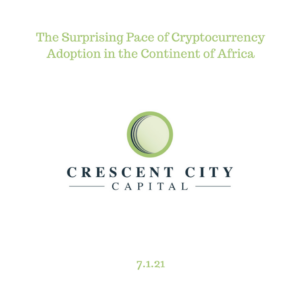The Surprising Pace of Cryptocurrency Adoption in the Continent of Africa
Written By: Kenichi Yamaguchi | July 1 2021
According to Chainalysis’s 2020 Cryptocurrency Geography Report, Africa is booming in the adoption of cryptocurrencies. Chainalysis is a blockchain analysis company that provides data, software, and services to government agencies, exchanges, financial institutions, insurance companies, and cybersecurity. And research. 50 countries.
According to the report, on-chain cryptocurrency activities in Africa have been further consolidated into the top 10 services in the region, and the share of these services in the overall activities in the region has increased from 67% in October 2019 to 78% in 2020. Most activity in Africa goes to Binance, which is the world’s largest cryptocurrency exchange in terms of trading volume. Provide a platform for trading various cryptocurrencies. The report stated that since the beginning of 2020, Binance’s share of all cryptocurrency activities in Africa has increased dramatically. Retail transfers (transfers below $10,000) account for a larger share of African cryptocurrency activity than any other region, and remittance demand is a large part of it.
However, the Central Bank of Nigeria recently ordered the bank to stop providing services to cryptocurrency providers. “Adoption is just beginning to take off in Africa, especially in Nigeria, where there has been an explosive growth last year,” said Buchi Okoro, co-founder and CEO of Quidax, a platform that allows people to buy and sell cryptocurrencies. “Trading is still going on on the exchange. [There] you will see the leak, but it is a far cry from the volume of transactions we have seen.”
Since Nigeria is excluded from what Mr. Okoro calls “global prosperity”, its Many people are now turning to peer-to-peer (P2P) communication. Unfortunately, the lack of regulation in some countries can cause problems with asset ownership. “We have seen a lot of activity through P2P exchanges, and then other exchanges are also trying to solve problems related to making money,” he said. “But in essence, it’s still about being able to find a delivery method.
In fact, P2P transactions are also a major trend in Kenya. Although the country’s central bank issued a warning notice to warn investors about cryptocurrency platforms, this has not stopped some people from jumping in. “A lot of people said on Twitter that their funds were still there when the bank closed their accounts because they somehow facilitated cryptocurrency transactions,” said Roselyne Wanjiru, Director of User Growth and Acquisitions at Pesabase. Pesabase is a platform. Enable users to send money and make payments. “But people also feel that if they can make money from it during the pandemic, that’s what they have to do.”
In addition to the lack of a reliable and affordable Internet (especially outside of urban areas), part of the problem surrounding the adoption of cryptocurrency in Africa is the uneven level of financial education. Most people don’t know the type of investment other than basic knowledge, such as real estate or stocks. Even those who have heard of certain billionaires may not understand how they accumulate wealth, and only think it has something to do with money.
“The later this information is communicated to the public, especially the younger generation, the less likely they will be eager for it in the first place,” Ms Wanjiru said. “This means that decentralized finance and cryptocurrency may face very niche risks in the future.” To make cryptocurrency more common, we must first decompose the concept of local language. However, although Ms. Wanjiru has seen some efforts to translate educational materials into Swahili, there are still hundreds of other languages and dialects across the African continent. “More work needs to be done to translate it into different local languages so that the elderly and those not in urban areas can access this information,” he said. “At the same time, various platforms should make it easier for people unfamiliar with cryptocurrencies to understand them.
Given the changing nature of the cryptocurrency world, one of the biggest risks is the lack of adequate regulation in some African countries. company went bankrupt overnight, not through its own fault, but regulation is what the industry needs most. “We do not have a regulatory framework. We follow policies on minimum capital and transaction limits granted to banks,” Okoro said. “But anything can happen at any time. So, in terms of what we are doing now, we have written some letters requesting supervision.” Related to the need for supervision is the need for trust. As someone who has been talking about cryptocurrencies for many years, Ms. Wanjiru has seen her friends shift from mild curiosity to a strong desire to participate. Ms. Wanjiru believes that to achieve mainstream adoption, especially when there are many conflicting opinions on this issue, the industry needs to be more consistent. “If they don’t trust me or see my consistency, then this trust is of little value,” she said. The lady said that if people don’t buy your platform, or download your app, or register to be a member of your community, you still need to be an authority by interacting with them and answering any questions they might ask Wanjiru: “Just stay in There, stay consistent and build trust, and let these people come (even after two or three years) and become your most loyal customers.”
Although the continent is still the smallest cryptocurrency economy of all the regions analyzed in the report, that year Only 8 billion US dollars have been received, and 8.1 billion US dollars have been sent on the chain, but relatively few activities are creating a world-changing value for the lives of users in the region facing economic instability, providing low-cost remittances and another kind of savings the way.

